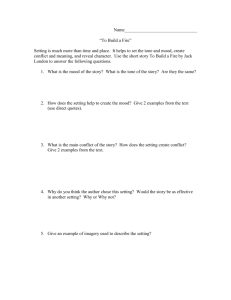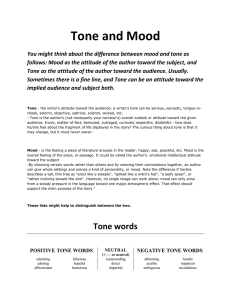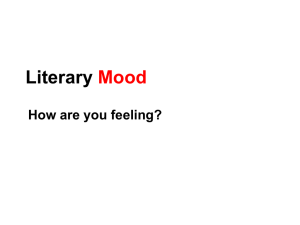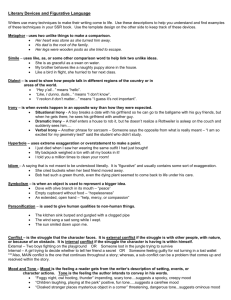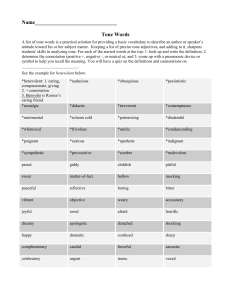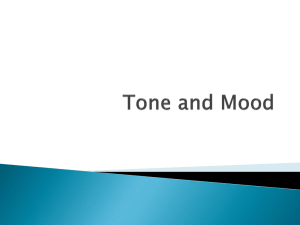Thematic Statements
advertisement
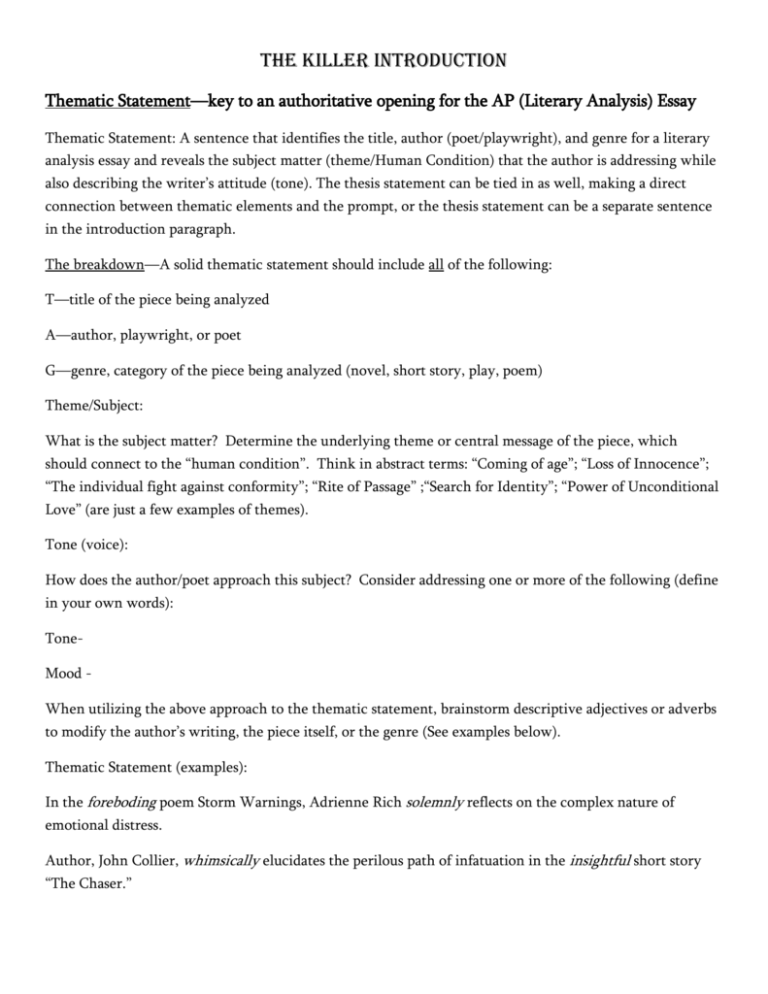
The Killer Introduction Thematic Statement—key to an authoritative opening for the AP (Literary Analysis) Essay Thematic Statement: A sentence that identifies the title, author (poet/playwright), and genre for a literary analysis essay and reveals the subject matter (theme/Human Condition) that the author is addressing while also describing the writer’s attitude (tone). The thesis statement can be tied in as well, making a direct connection between thematic elements and the prompt, or the thesis statement can be a separate sentence in the introduction paragraph. The breakdown—A solid thematic statement should include all of the following: T—title of the piece being analyzed A—author, playwright, or poet G—genre, category of the piece being analyzed (novel, short story, play, poem) Theme/Subject: What is the subject matter? Determine the underlying theme or central message of the piece, which should connect to the “human condition”. Think in abstract terms: “Coming of age”; “Loss of Innocence”; “The individual fight against conformity”; “Rite of Passage” ;“Search for Identity”; “Power of Unconditional Love” (are just a few examples of themes). Tone (voice): How does the author/poet approach this subject? Consider addressing one or more of the following (define in your own words): ToneMood When utilizing the above approach to the thematic statement, brainstorm descriptive adjectives or adverbs to modify the author’s writing, the piece itself, or the genre (See examples below). Thematic Statement (examples): In the foreboding poem Storm Warnings, Adrienne Rich solemnly reflects on the complex nature of emotional distress. Author, John Collier, whimsically elucidates the perilous path of infatuation in the insightful short story “The Chaser.” Mood Mood is the atmosphere of a piece of writing; it’s the emotions a selection arouses in a reader. Some common mood descriptors are: POSITIVE MOOD WORDS NEGATIVE MOOD WORDS amused awed bouncy calm cheerful chipper confident contemplative content determined dignified dreamy ecstatic empowered energetic enlightened enthralled excited exhilarated flirty giddy grateful harmonious hopeful hyper idyllic joyous aggravated annoyed anxious apathetic apprehensive barren brooding cold confining confused cranky crushed cynical depressed desolate disappointed discontented distressed drained dreary embarrassed enraged envious exhausted fatalistic foreboding frustrated futile gloomy grumpy haunting heartbroken hopeless hostile indifferent infuriated jubilant liberating light-hearted loving mellow nostalgic optimistic passionate peaceful playful pleased refreshed rejuvenated relaxed relieved satiated satisfied sentimental silly surprised sympathetic thankful thoughtful touched trustful vivacious warm welcoming insidious intimidated irate irritated jealous lethargic lonely melancholic merciless moody morose nauseated nervous nightmarish numb overwhelmed painful pensive pessimistic predatory rejected restless scared serious sick somber stressed suspenseful tense terrifying threatening uncomfortable vengeful violent worried Tone Tone is the author’s attitude toward a subject. While journalistic writing theoretically has a tone of distance and objectivity, all other writing can have various tones. If we were to read a description of a first date that included words and phrases like “dreaded” and “my buddies forced me to go on the date”, we could assume that the individual didn’t really enjoy the date. Some tone words include: POSITIVE TONE WORDS admiring adoring affectionate appreciative approving bemused benevolent blithe calm casual celebratory cheerful comforting comic compassionate complimentary conciliatory confident contented delightful earnest ebullient ecstatic effusive elated empathetic encouraging euphoric excited exhilarated expectant facetious fervent flippant forthright friendly funny gleeful gushy happy hilarious hopeful humorous interested introspective jovial joyful laudatory light lively mirthful modest nostalgic optimistic passionate placid playful poignant proud reassuring reflective relaxed respectful reverent romantic sanguine scholarly self-assured sentimental serene silly sprightly straightforward sympathetic tender tranquil whimsical wistful worshipful zealous NEUTRAL (+, –, or neutral) NEGATIVE TONE WORDS commanding direct impartial indirect meditative objective questioning speculative unambiguous unconcerned understated abhorring acerbic ambiguous ambivalent angry annoyed antagonistic anxious apathetic apprehensive belligerent bewildered biting bitter blunt bossy cold conceited condescending confused contemptuous curt cynical demanding depressed derisive derogatory desolate despairing desperate detached diabolic disappointed disliking disrespectful doubtful embarrassed enraged evasive fatalistic fearful forceful foreboding frantic frightened frustrated furious gloomy grave greedy grim harsh haughty holier-than-thou hopeless
